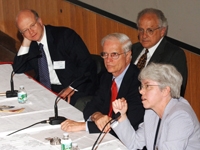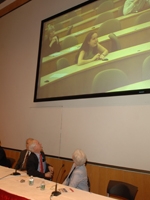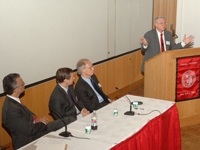
Panel speakers at the Cornell Business & Medicine Symposium included (seated from left) Drs. Christopher Earl, Bennett Shapiro, Marcus Reidenberg and Suzanne Hill.
"The word 'business' mentioned in the same sentence as medicine often solicits a sense of frustration or dismay among clinicians," says Adam Hill, an MD-MBA student at Weill Cornell Medical College and the Johnson Graduate School of Management at Cornell University.
Nevertheless, health care in America is deeply entwined with business, and the health care industry is responsible for revolutionary advances in imaging, genomics and medical devices that have put the U.S. at the forefront of medical research and innovation.
"However, there is an emerging belief that the business tools which assisted in this revolution — innovation, management strategy, operations, finance — also have the ability to fix the system itself, delivering high-quality medical care at a lower cost," says Hill.
To see how industry and medicine might collaborate on current health care issues and to foster greater collaboration between Weill Cornell in New York City and the Johnson School in Ithaca, Hill and a fellow student in the MD-MBA program, Dean Arnaoutakis, created the Cornell Business & Medicine Symposium, held April 30 in Uris Auditorium and simulcast with an audience in Ithaca.
"It would take you aback to see the rich and robust interactions between our bioengineering faculty in Ithaca and our medical oncology faculty here at Weill Cornell," said Stephen M. Cohen, executive vice dean for administration and finance and associate provost at Weill Cornell. "We need to supplement those types of laboratory and clinic partnerships with partnerships that deal with societal questions and socioeconomic issues."
The panel sought to address two of the major health care questions facing industry, academia and government today: Why has the market for drug development failed to help neglected diseases in the developing world, and how will changing reimbursement practices affect what it means to be a doctor?

The Symposium was simulcast to an audience at Cornell University in Ithaca.
Addressing the first question, Christopher D. Earl, Ph.D., president and CEO of BIO Ventures for Global Health, said that "there is a fundamental disconnect here. If it takes millions of dollars to develop a new drug or vaccine for any disease, how can a company justify doing that for patients that don't have any money?"
The key to developing these drugs, expert panelists agreed, is to create incentives for pharmaceutical companies to make drugs for the Third World.
Some of the more recent ideas discussed included patent pools, in which several companies share patents, or "advance market commitments," in which guaranteed orders are placed for drugs that have yet to be developed.
Ultimately though, the business model itself may have to be rethought, they said.
"We are at a watershed where we need to think about whether the straight profit model is sustainable and to look at more thoughtful models," said Suzanne Hill, Ph.D., secretary of Essential Medicines and Pharmaceutical Polices at the World Health Organization.
The second panel addressed how emerging pay-for-performance reimbursement models may change the health care landscape.
Currently, most physicians are paid by the amount of services they provide — scans, tests, X-rays — rather than how much they help their patients, which has led to ever-increasing health care costs, said Dr. Michael Wolk, clinical professor of medicine at Weill Cornell.
"Physician payment reform is essential," Dr. Wolk said. "We have to align payment incentives to move away from 'fee-for-service' and provide incentives for the value of care, not the quantity of care."

Dr. Herbert Pardes (at podium) and (seated from left) Drs. Aran Ron, Derek DuBois and Lawrence Casalino discuss the rising cost of health care and health care reform.
"The prospect of reform is very strong," said Dr. Herbert Pardes, president and CEO of NewYork-Presbyterian Hospital, adding that there is congressional leadership that may act as soon as this fall to introduce a health care reform bill.
However, in an afternoon spent talking about rising health care costs and the difficulties of drug development, Dr. Pardes was reminded that not everything should be reformed and that there was much to agree on.
"I'm not debating the fact that there are a lot of problems with our health care system; a legitimate concern is that the costs are just too high," Dr. Pardes said. "However, there is often a tendency to understate some of the good things in American health care. The issue is how to get it to everybody. I suspect that there would be few people who would argue against making health care as widely distributed as possible."
Photography by Jason Green.

